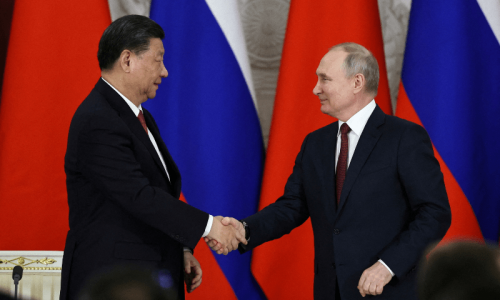ANKARA: Turkey has lost momentum in the war for northern Syria as the United States draws on Kurdish allies in the assault on IS-held Raqqa, but Ankara is still pressing Washington for a deal that allays its fears of Kurdish ascendancy.
Syrian Kurdish groups meanwhile sense Washington is now more firmly behind them than before, a shift they hope will eventually aid their ambitions for autonomy after years of persecution by the Syrian government.
One of the most complicated theatres in the multi-sided Syrian conflict, the war in the north has played out at lightning pace in the last few weeks with IS fighters either withdrawing or collapsing in swathes of territory.
The Russian-backed Syrian army has benefited from this, creating a corridor to the River Euphrates that secures Aleppo’s water supplies and suggests at least tacit coordination with US-allied Kurdish militia — at Turkey’s expense.
In a swipe at Washington, Turkish Prime Minister Binali Yildirim said on Tuesday it was unfortunate that some of Turkey’s allies had chosen the Syrian Kurdish YPG militia as a partner in the fight against IS in Syria.
“The field in Syria at the moment is really very complicated,” said a senior Turkish official, stressing the fast-moving nature of events and the urgent need for agreement. “Anything could happen at any moment.” “Such a harsh step in completely excluding Turkey there will cause a problem for relations between the countries,” the Turkish official said. “Hence a share point must be found. Talks are still continuing.”
Turkey has seized a swathe of Syrian land on its southern borders since launching its “Euphrates Shield” operation in August. Its main aim was to prevent creation of a contiguous Kurdish-held corridor it fears could threaten its security.
The rise of Kurdish power in northern Syria has caused alarm in Ankara, which views the Kurdish groups there as an extension of the Kurdistan Workers’ Party (PKK) that has been fighting an insurgency on Turkish soil for over 30 years.
Turkey’s military chief this week discussed Syria with his US and Russian counterparts. Turkish officials said the first day of talks had focused on ways to guarantee no inadvertent “friendly fire” clashes.
Conflicting US and Turkish agendas have surfaced clearly over Manbij, a city controlled by Kurdish-allied militia since its capture from IS last year. US forces were deployed there last week to deter a threatened Turkish attack.
Foreign minister Mevlut Cavusoglu made clear Turkish sensitivities about the presence of Kurdish militia in Manbij, a town Ankara sees as the next stepping stone in creation of a safe zone free of Kurdish influence west of the Euphrates. “We will not allow the YPG’s canton dreams [to come true], NTV television cited Cavusoglu as saying. If we go to Manbij and the PYD is there, we will hit them.”
A top US commander last week also delivered a robust defence of the YPG, saying he had seen no evidence linking them to attacks on Turkey and signalling some role for them in the final push for Raqqa — a predominantly Arab city.
US military ties with the YPG have deepened since the US-led coalition first provided air support to defeat IS in the Kurdish town of Kobane at the Turkish border two years ago.
The YPG now fights as part of an alliance called the Syrian Democratic Forces (SDF), which includes YPG-allied Arabs and is Washington’s main partner against IS in Syria
Turkey still hopes Washington will be forced to draw on its support in one way or another in the final assault on Raqqa.
A scenario mapped out in the Turkish newspaper Hurriyet saw Turkish special forces deploying alongside US special forces, FSA groups, Arab components of the SDF and Iraqi Kurdish forces.
But such a plan would need to navigate the hostility between the SDF and FSA, which have fought on and off across northern Syria for more than a year, and enmity between the main Syrian and Iraqi Kurdish groups.
Away from the battlefield, Turkish President Tayyip Erdogan cannot afford to appear to have been pushed aside in his campaign to secure Turkey’s frontiers. He faces an April referendum on sweeping new powers he deems vital to a country facing spillover of IS violence from Syria.
A senior Turkish official cautioned that Turkey’s intervention in Syria was not yet over. “At this stage, the Euphrates Shield operation has not been completed. We are discussing the next step with our allies,” the official said. “The US side made some promises for this before and we believe that they will provide this support.”—Reuters
Published in Dawn, March 10th, 2017












































Dear visitor, the comments section is undergoing an overhaul and will return soon.